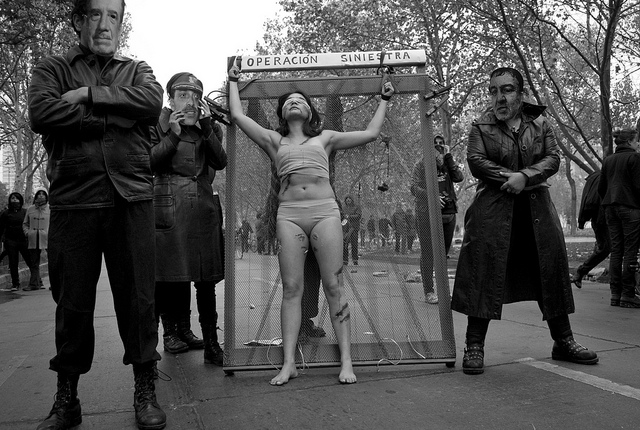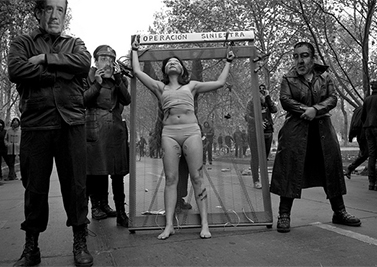
Erika Mitchell was born in 1963 to a Scottish father and Chilean mother. During her childhood in Britain, momentous events were taking place in her mother’s homeland. In 1970 Chileans elected Salvador Allende, Latin America’s first democratically elected Marxist president. Allende embarked on an extensive program of nationalization and sweeping social reform. Then, in 1973, General Augusto Pinochet ousted Allende in a CIA-sponsored coup and established himself as Chile’s dictator. The New York Times
Nearly thirty years later, Erika, writing under the pen name E.L. James, published
When Erika was born there were very few Latinos in England, but by the 1970s a significant immigration boom from Latin America had begun. Britain’s 1971 Immigration Act relaxed rules that had previously only allowed work permits for residents of current or former British colonies. In the first big wave of Latin American immigrants to England after the rule change, approximately 2,500 exiles arrived, most of them from Chile. Many were professionals or students who had fled due to the ongoing political instability, including right-wingers fleeing Allende’s socialist regime. After 1973, a second wave of exiles arrived who were fleeing the Pinochet dictatorship. Many of these Chilean immigrants settled in London.
Erika was ten years old when Pinochet seized power. Given her reluctance to discuss nearly all aspects of her personal life, it is impossible to know the depths of her family’s relationship to the Chilean immigrant community in the 70s and 80s. We do know that she and her mother spoke Spanish together, and that her mother was proud to expose a young Erika to Latin culture. But how long did they live in London? Erika went to high school a little over thirty miles outside the capital. Did she seek out information about her mother’s homeland? Her father was a BBC cameraman, so we can assume that their household was tuned in to the news. Erika herself went on to be a television producer, and she has expressed a love of both TV and film. As a teen, did she see or know about the American drama Missing, starring Jack Lemmon and Sissy Spacek? This film is based on the true story of a journalist from the U.S., who disappeared in the bloody aftermath of Pinochet’s coup. The film came out when Erika was in her teens, and was nominated for four Academy Awards, won for best screenplay, and picked up two more awards at Cannes. Missing was banned in Chile under Pinochet, and although neither he nor Chile are ever mentioned by name, the film states explicitly that the screenplay is based on a true story, the names of the people were not changed, and the specifics of two prominent Chilean cities are included. Did Erika pay attention? Did she recognize her mother’s homeland? Did it lodge in her unconscious, then fade into the background of her developing sexuality?
Carolina De Robertis is the author of two critically acclaimed novels set in Latin America. The first,
As the Fifty Shades phenomena continues to break records for the largest grossing book franchise, cultural critics try to understand what nerve it has touched in the zeitgeist.
As the Fifty Shades phenomena continues to break records for the largest grossing book franchise, cultural critics try to understand what nerve it has touched in the zeitgeist. Fifty Shades is billed as a mainstreaming of BDSM. However, members of the BDSM community have wholeheartedly rejected the book. They complain that kink cultural values are based in consent, not the controlling and manipulative behavior of the dominating billionaire character, Christian Grey.
From the beginning, the book has come under fire for its gender dynamics, but with the release of the film a new wave of criticism has emerged, focused on the class dynamics. In her
Lynn Parramore also
Erika isn’t forthcoming about much of anything, least of all her Latina heritage.
Adding to the gender and class analysis, I would add that there is a racial and colonial dimension as well. Erika Leonard looks like a middle-aged, white, plus-sized housewife, with her British accent and her shy, self-deprecating style, not an uncommon look for light-skinned Latinos with one white parent. My own Latina mother had a white father, and until adulthood she carried his non-Spanish surname. She grew up in the 50s, when racism led many Latino parents in the U.S. to discourage their children from learning and speaking Spanish. As an adult in the world, like Erika, my mother is often mistaken for white. However, as children, many mixed-heritage Latinos are only seen and known inside their family context. My grandmother was brown, and had a strong Spanish accent, so my mother grew up being targeted for and impacted by racism. The cousins on her father’s side slammed the door in her face and refused to see her because she was “colored.” My mother and aunt grew up in poverty because my widowed Puerto Rican grandmother couldn’t get work doing anything but scrubbing floors, even though she had been to a university and spoke several language. Erika isn’t forthcoming about much of anything, least of all her Latina heritage. However, this year on “The Today Show,” when she and the co-hosts lifted their mimosas to drink, she automatically said salud! Although she pronounced the Spanish toast with a British accent: “SAH-lewd.”
Did Erika have relatives living in Chile during the coup? Was her mother working to get any of them out of the country? Did any come to England? Did they tell stories of what had happened? Did Erika know then that
Erika didn’t begin writing until she was in her mid-40s, yet her inspiration was a story about a teenage girl. She became obsessed with the vampire romance
These are the dirty wars in Latin America retold via the trope of the virgin and the billionaire.
Like the protagonists of Fifty Shades and Twilight, Erika herself is awkward and naïve. No one could be more surprised than she is about the success of her books. According to
Fifty Shades reads like a mash-up of political dictatorship and teen romance. These are the dirty wars in Latin America retold via the trope of the virgin and the billionaire. While Fifty Shades is certainly a romanticization of an unhealthy relationship of domination, and could be read as a metaphor for late-stage capitalism, it could just as well be read as an allegory for Erika’s Latin American heritage. Whether the billionaire represents Pinochet or his American backers, the heroine Anastasia is an embodiment of the Chilean people: idealistic, vulnerable, and treated without mercy.

